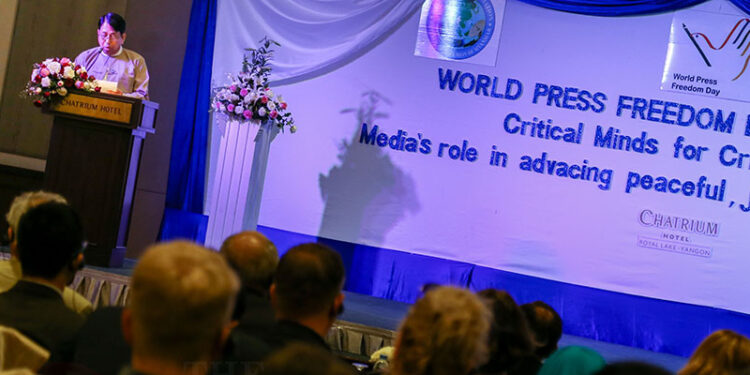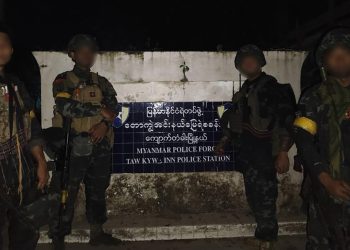RANGOON — Members of the Burmese media on Wednesday urged the government to avoid complacency in trying to advance press freedom in the country after it climbed 12 places on a recently released Reporters Sans Frontieres (RSF) index, but dropped 3.66 points in comparison to 2016.
Myanmar Press Council member U Thiha Saw told army and government officials, media groups, and international organizations during a conference at the Chatrium Hotel in Rangoon on World Press Freedom Day that Burma had “a long way to go” before reaching a level of press freedom that could be respected globally.
“Although Burma is 131 in the world press freedom rankings, there have been many prosecutions, like those under Article 66(d) of the Telecommunications Law, in the new government’s tenure,” he said, referring to the National League for Democracy (NLD) administration that was elected at the end of 2015. Press freedom in the country, he added, has “improved little.”
Out of the other Asean countries, Burma ranked third behind Indonesia and the Philippines.
At the conference, reporters asked information minister U Pe Myint about media restrictions implemented in the past year, including a ban on international organizations attending certain government conferences.
The minister said poor logistical arrangements had been interpreted as media restrictions, and argued that freedom of expression has improved since the era of the previous military-backed administration.
Myanmar Journalist Network (MJN) member U Than Htay encouraged the NLD government to strive for a higher standard in giving the public access to information.
“The Myanmar Journalist Network demands the government protect the journalists who were threatened on the ground while obtaining news with the framework of the law, and to investigate the unresolved murder case of Monywa-based journalist Ko Soe Moe Tun.”
Myanmar Press Council member U Thiha Saw said that access to information has proven more difficult under the NLD government than under the previous U Thein Sein administration.
Using Article 66(d), 56 cases of defamation have been filed since the NLD came to power just over a year ago. Among those charged are 12 journalists. Under former President Thein Sein’s government, there were only seven such cases put forward.
MJN representative U Than Htay claimed that some journalists have been declined bail and kept in prison. The MJN is also concerned the Burma Army has been closely watching the media and filing lawsuits against journalists who are critical of the military.
U Than Htay said that the MJN suggested the new government bring three crucial changes to the public and media: full access to information, freedom of expression, and protect the right to information.
“This will not be a good democratic country without press freedom,” he said.

















